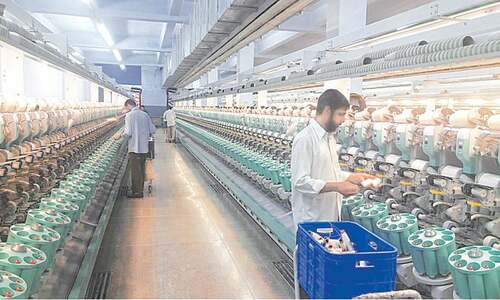ISLAMABAD: Large-scale manufacturing (LSM) in July shrank by 1.4 per cent compared to a year ago and by 16.5pc compared to June, official data showed on Thursday, raising concerns about an economic slowdown caused by the highest-ever cost of energy and raw material for industry.
The main contributors to the slowdown were garments (down 4.4pc), iron and steel products (0.6pc), furniture (2.2pc), chemical products (0.6pc), cigarettes (1.7pc), cement (2.8pc), and fertilisers (0.7pc), according to data released by the Pakistan Bureau of Statistics.
The indication of a slowdown started in June when manufacturing activity grew by only 0.2pc compared to the previous month. In the previous fiscal year, large-scale manufacturing grew 11.7pc year-on-year. The production estimation for LSM industries was made using the new base year of 2015-16.
Since September 2020, the sector has rebounded after months of a downturn. Initially, the pace was slow till December 2021 but rebounded from January onwards.
13 out of 22 sectors see decline in broad-based slowdown
The slowdown of LSM also appeared to be broad-based, with 13 out of 22 sectors of LSM witnessing negative growth in July, the first month of the fiscal year, while only seven sectors posted paltry growth.
During the 2021-22 fiscal year, the large-scale manufacturing sector, which accounts for 9.2pc of GDP, dominated the overall manufacturing sector with 74.3pc of the sectoral share, followed by a 15.9pc share of small-scale manufacturing (2pc of total GDP).
The textile sector also shifted into reverse, shrinking by 0.5pc in July over a year ago. Major negative growth originated from knitting wool at 100pc and woollen blankets at 73pc during the month under review. No growth was reported in the production of yarn and cloth during the month under review.
However, the production of garments posted growth of 48.5pc during the month under review. This is mainly because of higher demand for the garment sector.
In the food group, the production of wheat and rice milled dipped by 17pc and tea blended by 39pc.
Petroleum products posted a negative growth of 5.2pc in July. The automobile sector marked a negative growth of 7.4pc in July.
Iron and steel production jumped 13.2pc during the month under review. Production of non-metallic mineral products dipped 33.9pc. However, chemical products showed growth of 17.9pc. Sulphuric acid, hydrochloric acid, soda ash and toilet soap remained the major contributors to the overall growth in the chemical sector.
Published in Dawn, September 23rd, 2022











































